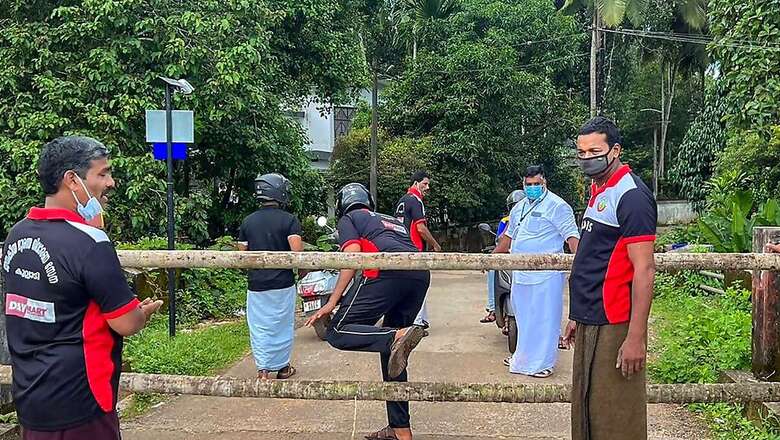
views
As the fear of Nipah gripped the coastal state of Kerala, the Indian Council of Medical Research (ICMR) on Friday said mortality among the infected is very high in the virus (between 40 and 70 per cent) compared to the mortality in Covid, which was 2-3 per cent.
However, ICMR DG Rajeev Bahl asserted that all efforts are on to contain the spread of the virus in Kerala. All patients are in contact of an index patient, he said.
#WATCH | Nipah virus | DG ICMR Dr. Rajiv Bahl says, “…If COVID had a mortality of 2-3%, here the mortality is 40-70%. So, the mortality is extremely high…” pic.twitter.com/O60erWop9v— ANI (@ANI) September 15, 2023
The brain-damaging virus has killed two people and infected three others in Kerala’s Kozhikode district so far. A central team, comprising experts from various fields, has also reached Kozhikode district to assess the situation and suggest remedial measures.
Nipah Virus: ICMR Suggests Precautionary Measures
The ICMR official also informed about precautionary measures to be taken against the prevention and spread of the Nipah virus. He highlighted the need for repeated hand washing and wearing face masks.
“There are 4-5 measures, some of them are exactly the same as that taken against COVID – repeated hand washing, mask. In this case, the most important is the contact with the human patient because most of the time, the first patient gets it from somewhere and the others are contacts of that patient…The third most important thing is staying away or not getting exposed to body fluids, and blood. So safety – biosafety, hospital safety, isolation.”
#WATCH | DG ICMR Dr. Rajiv Bahl lists out precautionary measures against the prevention and spread of the Nipah virus.“There are 4-5 measures, some of them are exactly the same as that taken against COVID – repeated hand washing, mask. In this case, most important is the… pic.twitter.com/3SP4hLl9s1
— ANI (@ANI) September 15, 2023
Addressing a press conference in New Delhi, ICMR DG Rajeev Bahl said India will procure from Australia 20 more doses of monoclonal antibody for the treatment of Nipah virus infection.
“We got some doses of monoclonal antibody from Australia in 2018. Currently, the doses are available for only 10 patients,” he said.
According to him, no one so far has been administered the medicine in India.
“Twenty more doses are being procured. But the medicine needs to be given during the early stage of the infection,” he said, adding it can only given as compassionate use medicine.
Why Nipah Cases Keep Surfacing in Kerala, ICMR Reacts
When asked why cases keep surfacing in Kerala, Bahl said, “We do not know. In 2018, we found the outbreak in Kerala was related to bats. We are not sure how the infection passed from Bats to humans. The link couldn’t be established. Again we are trying to find out this time. It always happens in the rainy season.”
He said monoclonal antibody has been given to 14 patients infected with Nipah virus outside India and all of them have survived.
“Only phase 1 trial to establish the safety of the medicine has been done outside. Efficacy trials have not been done. It can only given as compassionate use medicine,” he said.
Globally monoclonal antibody have been given to 14 patients infected with NipahVirus outside India and all of them have survived.
The decision to use the antibody, however, has to be of the Kerala government’s, besides that of doctors and also families of patients.
It is the fourth time the virus infection has been confirmed in the state. In 2018 and 2021 it was confirmed in Kozhikode and in 2019 in Ernakulam.
HOW NIPAH VIRUS SPREADS
The virus can spread through infected fruit bats to people and other animals, such as pigs. People can become infected if they have close contact with an infected animal or its body fluids, such as saliva or urine. Once it spreads to people, the disease can spread from person-to-person.
NIPAH VIRUS SYMPTOMS
The Nipah infection can cause problems ranging from respiratory issues to fatal encephalitis, meaning inflammation of the brain. The incubation period of Nipah infection varies from 4 to 21 days. In the initial stages, there may be symptoms like fever, headache, dizziness and vomiting.
Moderate to high grade fever, Headache, Vomiting, Cough, Breathlessness, Change in behaviour/sensorium, Seizures/abnormal movement, Myalgia or pain in a muscle and Fatigue are some symptoms of Nipah virus.
(With ANI, PTI inputs)




















Comments
0 comment